This link will hopefully be approved of by tomorrow. It links to a very short video of the march. And will let you get a feel of the atmosphere before and during the march.
http://www.archive.org/details/MakePovertyHistoryEdinburgh2005
64Kb Movie
256Kb Movie
Human Rights
Social and political issues related to Singapore and the South East Asia region. A blog which attempts to do so in a non-trivial manner treating opposing views with the respect they deserve. Contributions are welcomed from all regardless of your political persuasion.
2 Jul 2005
Edinburgh 2nd July 2005 - Pictures
Some pictures taken during the march in Edinburgh 2nd July 2005.
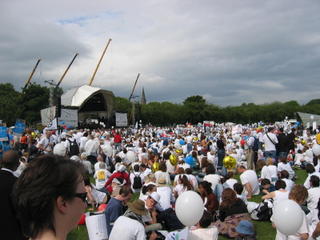
The crowd has started to mass in front of the main stage in Edinburgh.
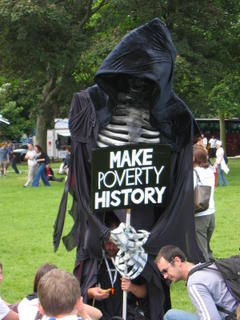
Some go to great lengths and a lot of effort.
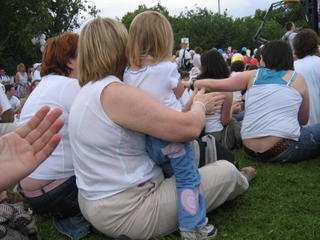
Mother and Daughter enjoying the live music.

The Band have finished and make their way to the front of the marchers.
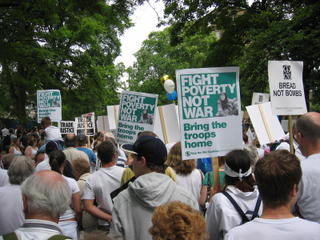
The Make Poverty History march starts to move through the streets.
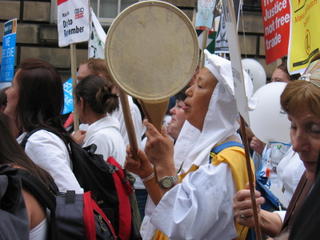
It was a very mixed crowd. Great to see.
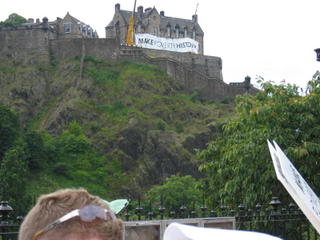
Even the Edinburgh Castle was getting in on the days demonstration.
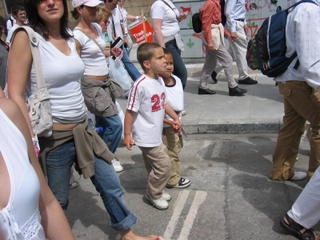
These two young youths were clearly intending to cause public disorder.
Human Rights

The crowd has started to mass in front of the main stage in Edinburgh.

Some go to great lengths and a lot of effort.

Mother and Daughter enjoying the live music.

The Band have finished and make their way to the front of the marchers.

The Make Poverty History march starts to move through the streets.

It was a very mixed crowd. Great to see.

Even the Edinburgh Castle was getting in on the days demonstration.

These two young youths were clearly intending to cause public disorder.
Human Rights
Edinburgh 2nd July 2005
Make Poverty History
The first band has just started, and the crowd are listening. The age group of the crowd is 'every-age'. From toddlers to old age pensioners. In fact if you listen carefully you will hear to old ladies talking through out the entire song.
The first band has just started, and the crowd are listening. The age group of the crowd is 'every-age'. From toddlers to old age pensioners. In fact if you listen carefully you will hear to old ladies talking through out the entire song.
Edinburgh 2nd July 2005
We had just arrived at The Meadows in Edinburgh, Scotland. We left home at 10am with our sandwiches packed and our white clothes. When we got to The Meadows the crowd was only beginning to mass.
We were among the first group to head off on the march through the streets of Edinburgh. Well behaved and extremely loud at times.
One speaker summed up all the fears and doubts. I am aware that me marching in Edinburgh is unlikely to result in an end to poverty. I am aware that the politics surrounding the debt relief, corruption, environment, EU subsidies. We are aware of these issues. Some of us have merely decided to let the G8 leaders know that we are watching them. We will carefully scrutinise what they say and we continue to monitor their actions not just their words. I am more sceptical and cynical regarding politics, than most people. I marched because I am not going to sit on my backside and do nothing. I am not going to point a finger and say look at the fools.
The march was organised by 'Make Poverty History' but many groups had shown up, PEACE, Socialist Workers, Anarchists... But mainly it was made up of couples, families, the elderly, young men and women. People just like me.
Pete Postlethwaite, one of the speakers summed it up using the words of Ghandi.
We were among the first group to head off on the march through the streets of Edinburgh. Well behaved and extremely loud at times.
One speaker summed up all the fears and doubts. I am aware that me marching in Edinburgh is unlikely to result in an end to poverty. I am aware that the politics surrounding the debt relief, corruption, environment, EU subsidies. We are aware of these issues. Some of us have merely decided to let the G8 leaders know that we are watching them. We will carefully scrutinise what they say and we continue to monitor their actions not just their words. I am more sceptical and cynical regarding politics, than most people. I marched because I am not going to sit on my backside and do nothing. I am not going to point a finger and say look at the fools.
The march was organised by 'Make Poverty History' but many groups had shown up, PEACE, Socialist Workers, Anarchists... But mainly it was made up of couples, families, the elderly, young men and women. People just like me.
Pete Postlethwaite, one of the speakers summed it up using the words of Ghandi.
"First they will ignore you, then they will laugh at you, then they will fight you, then you win."
1 Jul 2005
Different Religions Week
A special request from Nathan Black. Overcoming religious intolerance of any form is well worth a mention. I am aware that Singapore has widely publicised visits to various religious events by non-members.
School e-mail: nwblack@rice.edu
Movement e-mail: differentreligionsweek@yahoo.com
Human Rights
Dear Steven,
I am a student at Rice University in Houston and the founder of Different Religions Week, a week during which people are encouraged to attend services of faiths different from their own. I read your blog (http://singabloodypore.blogspot.com/) this January and determined that, based on the blog’s subject matter, you might be interested in posting a comment regarding the week — either agreeing or disagreeing with its concept or simply announcing that it is taking place.
Different Religions Week 2005 is July 15-22. I started the movement in 2003 to help curb people’s widespread ignorance of other faiths, which often leads to intolerance and which sometimes ultimately results in — or is used to justify — violence (consider, for example, 9/11 or the Bosnian conflict). More information about the how and why of the movement is available at http://www.differentreligionsweek.org.
There is no one “event” around which Different Religions Week is based; rather, people are simply encouraged to find and attend an unfamiliar religious service at their convenience during the week. (Atheist and agnostic meetings count too.) The movement’s Web site has links under “World Religions” to directories where people can get started finding a service.
Please consider posting a comment on or announcement of Different Religions Week 2005 on your blog, and e-mail me if you do so I can keep track of the Web presence of the movement. Thank you for your consideration and your time.
Sincerely,
Nathan Black
School e-mail: nwblack@rice.edu
Movement e-mail: differentreligionsweek@yahoo.com
Human Rights
Blogger Legal Liability Issues

I am aware that this is for American bloggers. If only we had a Singaporean lawyer blogging from Singapore. The law is different in every land so use the following as a guideline.
Blogger Legal Liability Issues
The Overview of Legal Liability Issues FAQ briefly addresses some common legal issues that affect you as a publisher, especially situations where you may face legal claims or threats based on the information you published on your blog.
The Bloggers' FAQ on Intellectual Property addresses issues that arise when you publish material created by others on your blog.
The Bloggers' FAQ on Online Defamation Law provides an overview of defamation (libel) law, including a discussion of the constitutional and statutory privileges that may protect you.
The Bloggers' FAQ on Section 230 Protections discusses a powerful federal law that gives you, as a web host, protection against legal claims arising from hosting information written by third parties.
The Bloggers' FAQ on Privacy addresses the legal issues surrounding the privacy rights of people you blog about.
Bloggers As Journalists
The Bloggers' FAQ on the Reporter's Privilege is useful to bloggers who report news gathered from confidential sources.
The Bloggers' FAQ on Media Access can help bloggers who need to get access to public records and government meetings, as well as secure press passes to help with newsgathering.
Other Legal Issues for Bloggers
The Bloggers' FAQ on Election Law addresses the legal issues you may face blogging about political campaigns.
The Bloggers' FAQ on Labor Law addresses legal issues with workplace blogging, including union organizing, protections for political blogging away from the workplace, and whistle blowing.
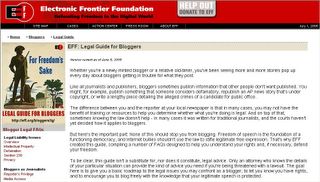
Singapore Rebel (bittorent)
If You Haven't Seen It Already...
... here's another chance.
These links are no longer working...
Click here instead http://www.archive.org/download/godboxone/singaporerebel.avi
Singapore Rebel (bittorent)
XVID movie codec (if you don't already have it. required for playing the avi file)
A link to download Azureus (a bit-torrent client) is on the Singapore Rebel bittorent page.
Whether or not you think Dr. Chee Soon Juan is an effective opposition politician (whatever "effective" means in the context of gerrymandering, defamation suits, and total media control by the ruling party), here's a chance to raise the hackles of the gahmen. Download it, get your friends to download it (use the "email a friend" tools on this page). Burn CDs, share them. Distribute. Blog about it. Get your friends who are not Singaporeans to blog about it as well. Think of it as a form of viral marketing - not necessarily FOR Chee, but FOR freedom of speech, FOR opposition parties in general and AGAINST the PAP.
Human Rights
... here's another chance.
These links are no longer working...
Click here instead http://www.archive.org/download/godboxone/singaporerebel.avi
Singapore Rebel (bittorent)
XVID movie codec (if you don't already have it. required for playing the avi file)
A link to download Azureus (a bit-torrent client) is on the Singapore Rebel bittorent page.
Whether or not you think Dr. Chee Soon Juan is an effective opposition politician (whatever "effective" means in the context of gerrymandering, defamation suits, and total media control by the ruling party), here's a chance to raise the hackles of the gahmen. Download it, get your friends to download it (use the "email a friend" tools on this page). Burn CDs, share them. Distribute. Blog about it. Get your friends who are not Singaporeans to blog about it as well. Think of it as a form of viral marketing - not necessarily FOR Chee, but FOR freedom of speech, FOR opposition parties in general and AGAINST the PAP.
Human Rights
30 Jun 2005
Paths Not Taken
I first spotted the links to the following at Singapore Angle.
Some of the contributions appear very interesting and if I had a very rich guardian angel I would attend.
2. History Spiked: The Death of the Liberal Ideal in Singapore Media
Dr Cherian George
Dr Cherian George is a postdoctoral research fellow at Nanyang Technological University.
Lawyers and Politics: 1945-1990
Dr Kevin Tan
Dr Kevin Tan is a private researcher in Singapore.
Related Link:
Paths Not Taken: Political Pluralism in Postwar Singapore
Human Rights
This is a project of the QUT Centre for Social Change Research (CSCR).
The project aims to recast Singapore's postwar history by studying the civil and political movements that have operated outside the parameters of imagination created by the ruling People's Action Party. The project draws from disciplines as diverse as history, cultural studies, anthropology, political science, sociology, law, gender and development studies, and architecture, and it studies an equally diverse range of ‘paths not taken’: party and activist politics; trade unions; commercial and professional organisations; social, intellectual, ethnic and religious movements, and; the media and service organisations. The project is intended to culminate in an international symposium and an edited book.
Some of the contributions appear very interesting and if I had a very rich guardian angel I would attend.
2. History Spiked: The Death of the Liberal Ideal in Singapore Media
Dr Cherian George
The press system in Singapore up to the 1970s included an adversarial tendencywithin the mainstream press, a contentious alternative press, and a live public discourse on press freedom. This paper will trace the closing off of these paths,leading up to the hegemonic, non-contentious and “nation-building” press system of post-70s Singapore. It will argue that the state achieved this closure not only by overt political repression but also by riding global trends in media economics and intellectual culture, which tended in the direction of industry concentration and commercialisation, at the expense of media diversity and public service.
This explanation for the prevailing media system refutes the cultural arguments that are currently mustered in its defence – that the system is a reflection of Asian values that emphasise consensus and harmony – and argues instead that it was a matter of deliberate political engineering by the PAP regime. Finally, the paper will attempt to locate vestiges of counter-hegemonic practice and discourse within the Singapore media system and assess their potential.
Dr Cherian George is a postdoctoral research fellow at Nanyang Technological University.
Lawyers and Politics: 1945-1990
Dr Kevin Tan
This paper examines the relationship between the legal profession and politics in Singapore from 1945 to 1990. The relationship between law and politics is a close one, especially in the aftermath of World War II and the rapid decolonization within the British Empire. This took on an greater significance given the number of lawyers involved in post-War political developments throughout the Empire. Singapore was no exception and it came as no surprise that the first Chief Minister and Prime Minister of Singapore were both lawyers.
The active role that lawyers played, both individually and collectively – through institutions such as the Bar Committee and its successor, the Law Society, as well as through political parties – in the immediate post-War period contrasts markedly with the relative inactivity of the profession in the 1980s and 1990s. It is also significant that the legal profession provided key political players who spanned the entire political spectrum during the formative years of Singapore’s nationhood. This plurality of views and visions for an independent Singapore was a path that was not taken; a path which could have led to quite a different Singapore.
This paper adopts a chronological approach and is organized in three parts. In Part I, we consider the period from 1945 to 1955, looking at the role lawyers and institutions played in the fight for self-government, and their competing visions for Singapore. In particular, the role of the Progressive Party under CC Tan, the Labour Front under David Marshall and the PAP under Lee Kuan Yew will be compared and contrasted. Part II will consider the developments from 1955 to 1965, the period of transition from the Rendel Constitution to Singapore’s separation from Malaysia. Focus will beon the roles played by Lee Kuan Yew, EW Barker, KM Byrne (from Singapore) and Tunku Abdul Rahman and Tun Razak (from Malaysia) in this whole process. Part III concentrates on the post 1965 developments with discussion on the role of lawyers in the nation-building process. In particular, we will consider how the Law Society tried to find a voice in this process and ended up being crushed. Key figures who will be considered in this period are Francis Seow, Toh Soh Lung. The role played by opposition lawyers like Chiam See Tong will also be discussed in passing. Finally, I will discuss the establishment of the Singapore Academy of Law and how its expanded role has silenced the pluralistic political discourse that saw a brief flowering in the 1980s.
Dr Kevin Tan is a private researcher in Singapore.
Related Link:
Paths Not Taken: Political Pluralism in Postwar Singapore
Human Rights
Calling all Bloggers: Get Skyped

Get your actual voice heard by a global audience. Introduce your blog and tell the world what it’s like to be a blogger in your country.
If you don’t already have Skype, please get it.
I look forward to talking to you soon. If I am not online then simply leave me a voice mail and I will get back to you asap.
To start go to Skype and download the free software. Invest a few dollars in headphones and microphone set. Then simply click on the Skype botton
 in the right hand column.
in the right hand column.Human Rights
Old Age A Blessing? Not in Singapore
Filial Piety in Singapore? In order to understand the true level of caring I would walk into a local fast food restaurant. The sight of an elderly lady, stooped over emptying rubbish is an image that will stick with me forever. The thought that my grandmother or grandfather would still have to work after 60-65 makes me sick. If one sphere of the population deserve health care and some level of payment from the state in the form of welfare, or 'pensions', then there can be no better deserving than the elderly.
When I hear the empty words of politicians referring to filial piety or 'how the elderly can continue to contribute' I realise just how much hot air politicians like to emit.
TODAY
30 JUNE 2005
----------------------------------------
Human Rights
When I hear the empty words of politicians referring to filial piety or 'how the elderly can continue to contribute' I realise just how much hot air politicians like to emit.
TODAY
30 JUNE 2005
----------------------------------------
THERE is nothing more comforting than to be reminded that you were once young.
That once, you moved to the rhythm of music effortlessly; that once, you were in love and could still feel what it is to be in love when you listened to romantic melodies.
It is also empowering to find that one can be 69 or 70 and enjoy what one enjoyed twenty, thirty or even forty years ago.
I realised this the night of the Engelbert Humperdinck concert.
It was one of those rare times I felt I was not the oldest in a crowd. I saw familiar faces who were there to recall good old times that seemed to be disappearing quickly.
We were all 20 once again.
Engelbert Humperdinck reminded us - if we needed reminding at all - that life is not over yet for those of us in our 60s and 70s. Even if we may look a bit worse for wear and our faculties compromise, or if we elapse into "senior moments" now and then.
There he was on stage, a bit thicker in the middle, a bit broader in the jowls, a bit stiffer in the joints. But with the same magic that had captured audiences the world over for almost 40 years.
During the concert, for some reason I can't recall, Engelbert Humperdinck mentioned social security and asked if we got pensions.
There was this very telling silence. Reality of life for the old put a damper on the evening.
Life is difficult for older people in Singapore.
The Aware-Tsao Foundation report published recently concluded that "older women are in a particularly vulnerable position in their later life because of the lack of income over their lifetime, an old age income security system … the lack of an adequate and inclusive health care financing mechanism that covers those not in formal employment, and a family situation that can no longer sustain its care giving and providing role for its older relatives."
The report adds that the responsibility to support the older population goes beyond the immediate family.
The Government, the private sector and communities all have a role to play to ensure that the older population feels valued and able to contribute.
For instance, the estate that I live in is undergoing upgrading. It is costing many millions of public funds, no doubt.
Has it made the buildings wheelchair-friendly? No. In this supposedly family-friendly society, is any consideration given to young mothers with strollers?
Sometimes, I wonder if one arm of government knows the policies being promoted by the other arms.
I move between despair and exaltation when I think of my own old age. The exaltation comes from imagining new visions, new states of personal realisation emerging at this stage of my life.
But then, public policies in healthcare, housing, education and labour - despite new initiatives being announced recently - seriously lag behind the needs of a growing elderly population.
Health costs keep rising. There are few support systems. Nor is there sufficient financial security - even with the CPF scheme intended, ironically, for this purpose.
So, what will nourish the visions of ageing men and women like myself, who want to live independent lives?
To say that taking care of the aged is the responsibility of the family is to deny the state's responsibility to provide an environment that makes life easier for an ageing population.
It is also a denial of the reality of life for those Singaporean families which struggle to make ends meet.
One 84-year-old aunt I know has been praying for death for 10 years. Old age has made her dependent on two daughters who have, she says, the unhappy burden of looking after her.
Another 96-year-old aunt, hearty and mobile, has been shunted from son to son for 10 years.
Old age is not a blessing. And even those of us who can afford to attend a concert, can escape from the worries of ageing only for a moment.
The writer, a social activist and teacher, is a former president of Aware and SCWO.
Human Rights
Subscribe to:
Posts (Atom)
